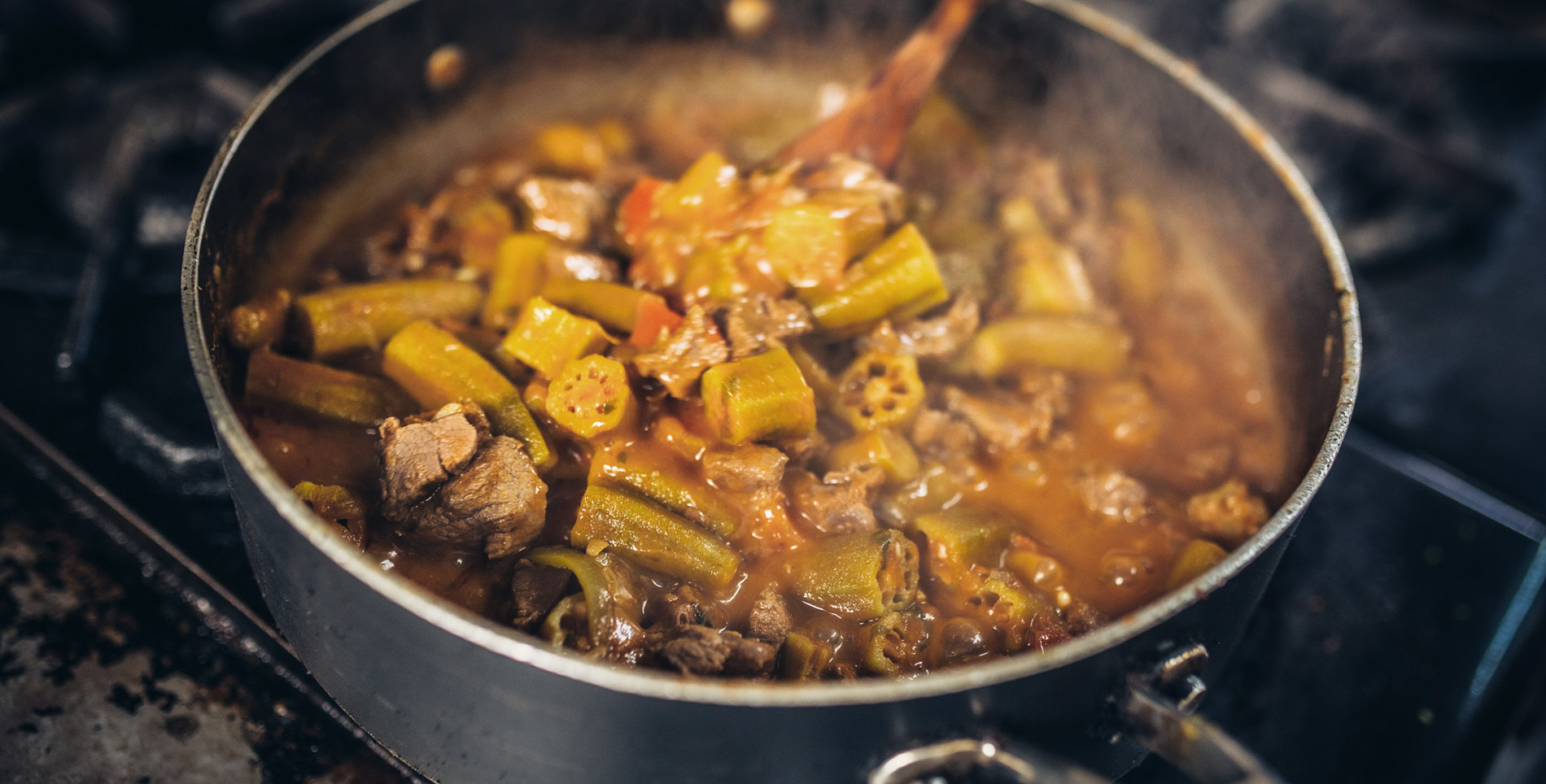Editor’s Note: This story is published in The What We Carry Issue of Life & Thyme Post, our exclusive newspaper for Life & Thyme members. Get your copy.
The first time James Beard award-winning food historian and Koshersoul author Michael W. Twitty ate okra, he hated it. “I pretended to eat it and swallow it. And then I walked upstairs and spat it out into the bathroom sink,” he says. In the United States outside of the South, okra is often polarizing. While the vegetable’s grassy taste brings comfort for many, okra’s fibrous exterior and unique texture has been known to trigger repulsion. However, across the Southern part of the country, the food is revered. Here, opinions surrounding okra are less about “if you like it,” and more about “how you like it.”
Charlotte Lyons, who grew up in Atlanta, recalls the sliminess of the boiled okra she first ate when she was eight years old. It wasn’t until the former Ebony Magazine food editor and columnist tried her grandmother’s crispy fried okra fritters that she warmed up to the food. “That was my first introduction to really learning to like okra,” she laughs.
From Lowcountry-style okra and rice to Middle South pickled okra or the iconic Louisiana gumbo, okra in its many uses as an ingredient is undoubtedly a staple of Southern cooking. Yet, in spite of okra’s cherished position in Southern kitchens, the precise historical origin point remains somewhat foggy. A cursory internet search will show that the vegetable’s origins are still considered “disputed” and “unknown.” What we do know, however, is that okra is African.
Part of the evidence of okra’s heritage lies in that the vegetable is as much a West African staple as it is a Southern staple. Serigne Mbaye, a New Orleans-based chef whose childhood was split between Dakar, Senegal, and New York City, reminisces on the Senegalese soupou kanja his mother regularly cooked for the family. Mbaye is among the chefs who consider gumbo to be an offshoot of soupou kanja, which is also a stew with okra, seafood and meat as the star ingredients. “The sliminess of the okra and the saltiness of the sea compliment each other very well,” remarks Mbaye. “If only we knew how smart our ancestors were when they matched okra with seafood.”
The community that holds the key to understanding okra’s journey to America—from soupou kanja ingredient to gumbo ingredient—is the same group that was forcibly distanced from roots in Africa, and, as a result, similarly possesses a proud, but vague title of “African.” The predominant folktale in African American communities is that okra was carried to the U.S. as a symbol of home.
“I know that a lot of the slaves, when they were forced onto the Middle Passage, they would put okra seeds in their hair or hide it somewhere,” explains Lyons. “They were the ones that brought the seeds to America.”
The story of enslaved people having okra seeds braided into their hair in order to have a piece of home wherever they ended up became the primary way to piece together okra’s African roots and its strong position in Black American culinary history. Twitty likens the way the tale has gained traction as the way certain phrases like “I have eyes in the back of my head”—while not literally feasible—have become a means to communicate an underlying meaning or intention.
“I’m skeptical of it, but I think it also represents the beautiful, lyrical metaphors that we live by. I figure it really means we kept the seeds in our head, in the luggage between your ears—your brain,” explains Twitty. He estimates that enslaved people made a point to retain and pass down information about okra—what it looked like and how to cook it, for example.
Mbaye believes there is more to be gained from understanding okra’s history through its culinary journey. “I think sometimes we need to be very careful of how we tell the story, especially chefs. We know that if it wasn’t for [the Black diaspora], okra would never be a Southern cooking staple. But we’ve lost the stories of how it got here,” explains Mbaye. “So I don’t focus on that. I focus on how that ingredient has changed, and is still completely changing.”
Looking at okra’s role as an ingredient reveals a food that became a cherished part of Southern cuisine. Twitty supposes that okra arrived in the U.S. sometime between 1710 and 1730. By 1760, it was being documented in botanical journals and Thomas Jefferson referred to it as a common vegetable. In 1780, it was commonplace on Southern kitchen tables. Some 100 years later, during the Civil War, enslaved people used seeds and scraps to make “okra coffee.” “They would sell it to Confederate soldiers who were running out of their coffee rations,” Twitty describes.
It is clear how and why okra has always been a pivotal ingredient in Black culture. But how did it become more broadly claimed as a Southern staple in the U.S.?
The answer lies, once again, in the experience of Black Americans.

“The [Antebellum] Plantation South was a school for the Africanization of white people,” says Twitty. “Whether or not you were wealthy, you had intimate and constant interactions with people of African descent.”
As enslaved people were ensuring their culinary traditions would be passed down within their own culture, those same traditions were observed and learned by those who enslaved them. And, as that process ensued, the way okra in particular was used and cooked continued to transform in ways inherent to how enslaved people, and eventually Black communities, had to shift.
“Those transformations matter. Those transformations are real and apparent things always were dynamic,” says Twitty.
Okra’s journey as an ambiguously African vegetable to Southern staple embodies the Black experience that cultivated and curated the way it’s enjoyed and eaten today. From the Gullah communities in the South’s Lowcountry regions to Black Creole communities in Louisiana, okra’s prominence as an ingredient has always stayed constant. It was the style of cooking that morphed along with the experience of the communities who kept and shared the knowledge of it.







Our comments section is for members only.
Join today to gain exclusive access.